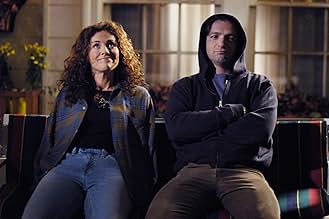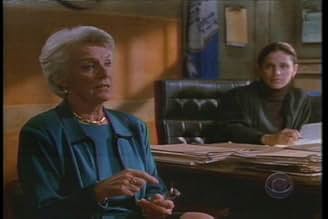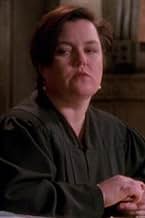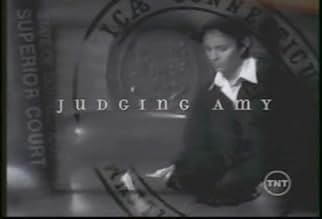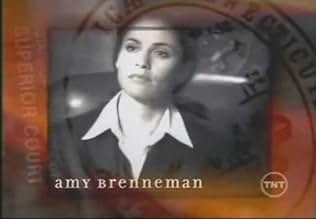Ajouter une intrigue dans votre langueA family drama focused on three generations of women living together in Hartford, Connecticut.A family drama focused on three generations of women living together in Hartford, Connecticut.A family drama focused on three generations of women living together in Hartford, Connecticut.
- Récompensé par 1 Primetime Emmy
- 13 victoires et 47 nominations au total
Parcourir les épisodes
Histoire
Le saviez-vous
- AnecdotesThe series is based on the real-life experiences of Amy Brenneman's mother Frederica, a judge of the Connecticut State Superior Court.
- Citations
Amy Gray: [after being shouted out, Maxine rushes into the kitchen] Mom, are you OK?
Maxine Gray: [trying not to laugh] Of course, but I am 65 years old, and my boyfriend's mother hates me
- ConnexionsFeatured in The Rosie O'Donnell Show: Épisode #4.170 (2000)
Commentaire à la une
Did you ever notice your major network's morbid fascination with death? Nearly every prime-time drama is a law enforcement drama from the perspective of cops, criminal investigators, or lawyers. And nearly everyone is about investigations into violent crimes. Take CSI, for example, a forensics show piecing together the clues behind violent homicides. Law & Order, no matter which one you watch, is usually about brutal crimes as well. These two I give as examples considering their popularity among network viewers.
But Judging Amy is quite a refreshing break from the world of violent crime, though it is not without it's share into the investigation of some violent crime. However, it is also not done so morbidly. Judging Amy is a show about the legal system as well as a regular drama about the regular, normal lives of the character. In a day and age of violent television, it offer a little bit soap drama (but not sappy drama) and a bit of humor (particularly from Amy's mom, the witty Maxine Gray).
Amy Gray (Amy Brennan) is a judge in family court. As a single mother, she lives with her mother, Maxine, (the wonderful Tyne Daily), and her daughter (Lauren Karle Warren). There's also Amy's charismatic and poignant friend, Donna, her clerk, and Bruce Van Exel (Richard T. Jones) who is Amy's coworker as well as her source of direction on many occasions. So, we see Amy on two fronts: as the family court judge and as single mother and member of a busy family.
Thus, the show caters to an audience just looking for a regular drama as we see the various situations surrounding the Gray family life such as the lessons Amy tries to teach her teenage daughter, or Maxine's or Amy's love life dilemmas, or perhaps what her cousin Kyle is up to, or the difficulties her brother and sister-in-law are going through. There's always something going on. And the characters are all interesting enough to care.
Judging Amy, too, is good as a critique into the legal system. Three members of the family work in public service (her brother works in insurance, so he doesn't count). Maxine is the brazen social worker at DCF and is determined to make the system work to help as many people as she possibly can, even when the bureaucratic processes try to slow her down (remember when they wanted to fire her for speaking against the mayor for the underfunding of the children's home). These are where most of the arguments about flaws in the cumbersome family law policy comes from because Amy, as a judge, can only make such arguments personally, so they occur sometimes rarely. And her cousin Kyle, worked in a shelter and now in a hospital, and is faced, too, with similar frustrations with a neglecting system of public service.
Likewise, even Bruce is interesting as a vehicle for the arguments against the family law system when he is working as a mediator, attempting to fix situations without having to send parents or children into state custody, and hoping they can fix those problems without an abundance of recidivism. All of these characters are there to make the policy arguments that the show intends.
So, Judging Amy presents two spheres, both enjoyable. And the actors do a terrific job. It's really quite a different show, breaking away from the strict examination of the legal system, but not being thrust into a pure soap drama (but again, even if it were, it's less sappy and much more viable than your soap dramas). The strikes a balance. Not only that, because the show involves a single mother and the dominance, too, of her own mother (Maxine), it is a likely quite a popular show among women. Even so, it is not female dominated. Other characters are probably given equal concentration even though Amy and Maxine are pretty much the main characters, both working as counterparts of one another. Amy sometimes seems less sure of herself, less willing to be on the offensive. Maxine is much more bold, more willing to break the rules if it going to help things along. And she always seems to know what she's doing and how to go about it.
It's a pretty good show, different than most of what's out there on network television, and probably worth your time.
But Judging Amy is quite a refreshing break from the world of violent crime, though it is not without it's share into the investigation of some violent crime. However, it is also not done so morbidly. Judging Amy is a show about the legal system as well as a regular drama about the regular, normal lives of the character. In a day and age of violent television, it offer a little bit soap drama (but not sappy drama) and a bit of humor (particularly from Amy's mom, the witty Maxine Gray).
Amy Gray (Amy Brennan) is a judge in family court. As a single mother, she lives with her mother, Maxine, (the wonderful Tyne Daily), and her daughter (Lauren Karle Warren). There's also Amy's charismatic and poignant friend, Donna, her clerk, and Bruce Van Exel (Richard T. Jones) who is Amy's coworker as well as her source of direction on many occasions. So, we see Amy on two fronts: as the family court judge and as single mother and member of a busy family.
Thus, the show caters to an audience just looking for a regular drama as we see the various situations surrounding the Gray family life such as the lessons Amy tries to teach her teenage daughter, or Maxine's or Amy's love life dilemmas, or perhaps what her cousin Kyle is up to, or the difficulties her brother and sister-in-law are going through. There's always something going on. And the characters are all interesting enough to care.
Judging Amy, too, is good as a critique into the legal system. Three members of the family work in public service (her brother works in insurance, so he doesn't count). Maxine is the brazen social worker at DCF and is determined to make the system work to help as many people as she possibly can, even when the bureaucratic processes try to slow her down (remember when they wanted to fire her for speaking against the mayor for the underfunding of the children's home). These are where most of the arguments about flaws in the cumbersome family law policy comes from because Amy, as a judge, can only make such arguments personally, so they occur sometimes rarely. And her cousin Kyle, worked in a shelter and now in a hospital, and is faced, too, with similar frustrations with a neglecting system of public service.
Likewise, even Bruce is interesting as a vehicle for the arguments against the family law system when he is working as a mediator, attempting to fix situations without having to send parents or children into state custody, and hoping they can fix those problems without an abundance of recidivism. All of these characters are there to make the policy arguments that the show intends.
So, Judging Amy presents two spheres, both enjoyable. And the actors do a terrific job. It's really quite a different show, breaking away from the strict examination of the legal system, but not being thrust into a pure soap drama (but again, even if it were, it's less sappy and much more viable than your soap dramas). The strikes a balance. Not only that, because the show involves a single mother and the dominance, too, of her own mother (Maxine), it is a likely quite a popular show among women. Even so, it is not female dominated. Other characters are probably given equal concentration even though Amy and Maxine are pretty much the main characters, both working as counterparts of one another. Amy sometimes seems less sure of herself, less willing to be on the offensive. Maxine is much more bold, more willing to break the rules if it going to help things along. And she always seems to know what she's doing and how to go about it.
It's a pretty good show, different than most of what's out there on network television, and probably worth your time.
- vertigo_14
- 27 avr. 2004
- Permalien
Meilleurs choix
Connectez-vous pour évaluer et suivre la liste de favoris afin de recevoir des recommandations personnalisées
Détails
- Date de sortie
- Pays d’origine
- Site officiel
- Langue
- Aussi connu sous le nom de
- Judging Amy
- Lieux de tournage
- Sociétés de production
- Voir plus de crédits d'entreprise sur IMDbPro
Contribuer à cette page
Suggérer une modification ou ajouter du contenu manquant



